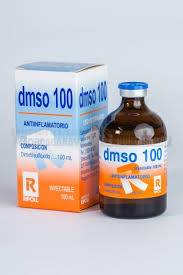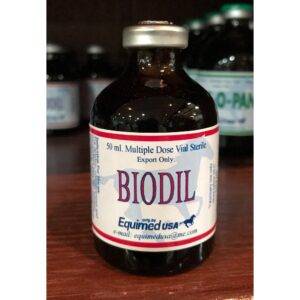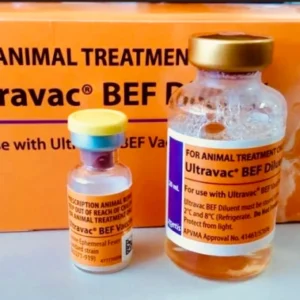DMSO 100 ml
DMSO (Dimethyl Sulfoxide) 100 ml is a versatile veterinary and medicinal product known for its anti-inflammatory, pain-relieving, and antioxidant properties. It is widely used in horses and other animals to treat various conditions, especially those related to pain, swelling, and inflammation. Below is a comprehensive overview of DMSO, including its uses, benefits, and precautions:
What is DMSO?
Dimethyl Sulfoxide (DMSO) is a sulfur-containing organic compound derived from lignin, a natural substance found in wood. It has unique chemical properties, making it an excellent solvent and carrier for other medications. In veterinary medicine, it is commonly used topically, orally, or intravenously to treat inflammation, pain, and other conditions.
The 100 ml formulation of DMSO is typically used for external application but can also be administered in other ways depending on the veterinary recommendation.
How Does DMSO Work?
Anti-inflammatory: DMSO inhibits the formation of inflammatory chemicals (such as prostaglandins), which helps reduce swelling and pain.
Pain Relief: It acts as a local analgesic by interfering with nerve conduction and reducing pain sensations.
Free Radical Scavenger: DMSO is an antioxidant, meaning it neutralizes free radicals that cause cellular damage, thereby reducing inflammation and promoting healing.
Carrier Agent: DMSO can penetrate biological membranes (like skin), making it an excellent carrier for delivering other medications (e.g., corticosteroids or antibiotics) deep into tissues.
Uses of DMSO in Veterinary Medicine:
DMSO has several key applications, particularly in horses and other large animals:
Joint Inflammation and Arthritis: DMSO is often used to treat joint pain, swelling, and inflammation in horses suffering from arthritis, synovitis, or other inflammatory conditions.
Tendon and Ligament Injuries: It helps reduce swelling and inflammation in soft tissue injuries, promoting faster healing and recovery.
Muscle Pain and Strains: DMSO is effective for relieving muscle soreness or stiffness due to exercise or injury.
Laminitis: In horses, DMSO is used to reduce inflammation in cases of laminitis, a serious condition affecting the hooves.
Swelling and Edema: DMSO helps reduce fluid buildup and swelling in tissues, especially following an injury.
Carrier for Other Medications: DMSO can be combined with other medications to enhance their absorption and effectiveness, such as corticosteroids, antibiotics, or antifungal agents.
4. Dosage and Administration:
DMSO is available in different concentrations (e.g., 70%, 90%), and the 100 ml product is typically applied topically. The following is an example of how it may be used, but always consult a veterinarian for specific instructions:
Topical Application:
DMSO is applied directly to the affected area of the skin. It is often used for joint and muscle pain, swelling, and localized inflammation.
Apply sparingly, as a thin layer, and gently massage into the skin.
It may be used once or twice daily, depending on the severity of the condition.
Dilution: In some cases, DMSO is diluted before application. This is often necessary when applied to sensitive skin areas or when used in combination with other medications.
Oral or Intravenous Use: Although less common, DMSO can be administered orally or intravenously in some cases, under the supervision of a veterinarian.
Precautions and Side Effects:
While DMSO is widely used and considered safe when used correctly, there are important precautions to take:
Skin Irritation: DMSO can cause skin irritation, redness, or burning, especially if used in high concentrations or on sensitive areas. It is essential to monitor the skin for any adverse reactions.
Odor: One of the most noticeable side effects of DMSO is its strong garlic-like odor, which is excreted through the skin and breath. This odor is harmless but may be unpleasant. DMSO 100 ml
Allergic Reactions: In rare cases, animals may have an allergic reaction to DMSO, showing symptoms such as swelling, difficulty breathing, or hives. If this occurs, discontinue use and seek veterinary advice immediately.
Penetration of Contaminants: Since DMSO easily penetrates the skin, it can carry other substances, including dirt or bacteria, into the body. Therefore, the application site should be thoroughly cleaned before use.
Systemic Effects: When used in high concentrations or over large areas of the body, DMSO can cause systemic side effects such as headaches, dizziness, or nausea in the handler or animal.
Precautions When Handling DMSO:
Use Gloves: Always wear gloves when applying DMSO to prevent it from being absorbed through your own skin.
Avoid Contact with Eyes or Mucous Membranes: DMSO can cause irritation if it comes into contact with the eyes, nose, or mouth. In case of accidental contact, rinse thoroughly with water.
Clean Application Area: Ensure the animal’s skin is clean and free of any chemicals, dirt, or debris to prevent contamination.
Potential Drug Interactions:
DMSO can enhance the absorption of other medications, so it’s important to consult a veterinarian before combining it with other treatments. Some medications, when used with DMSO, can increase the risk of side effects or toxicity.
Legal Considerations:
Regulations in Competition: DMSO is generally allowed in equine sports but may have specific withdrawal periods before competition. Always check the rules of the governing body or competition to avoid any violations. DMSO 100 ml
Prescription Status: In some countries, DMSO may require a veterinary prescription, while in others it is available over the counter.
Where to Buy DMSO:
DMSO 100 ml is available through veterinary supply stores, online veterinary pharmacies, and some general pharmacies that carry veterinary products. Make sure to purchase from reputable sources to ensure product quality and safety.
10. Summary of Benefits:
Anti-inflammatory: Reduces swelling and inflammation in joints, muscles, and tendons.
Analgesic: Provides localized pain relief.
Antioxidant: Protects tissues from oxidative stress and free radicals.
Enhances Medication Absorption: Acts as a carrier for other medications, improving their efficacy.
Versatile Use: Suitable for a wide range of inflammatory and painful conditions, particularly in horses.
Conclusion:
DMSO 100 ml is a valuable tool in veterinary medicine, particularly for treating inflammation, pain, and soft tissue injuries in horses and other animals. While it has a wide range of beneficial applications, it must be used carefully to avoid side effects, contamination, and improper use. Always follow veterinary guidance for the correct dosage and administration.





Reviews
There are no reviews yet.